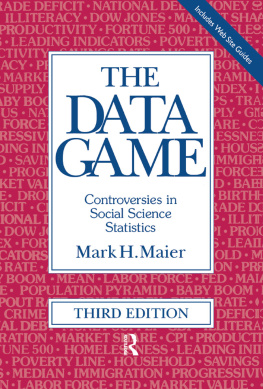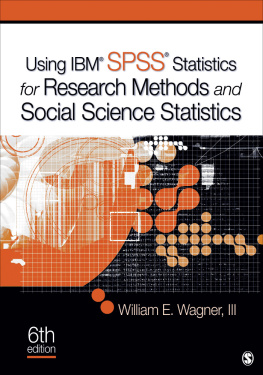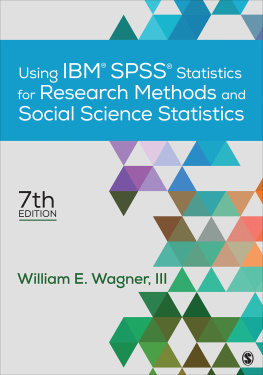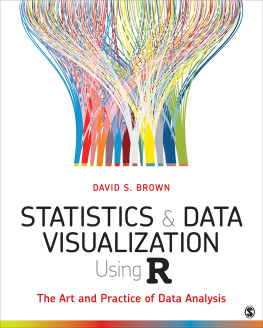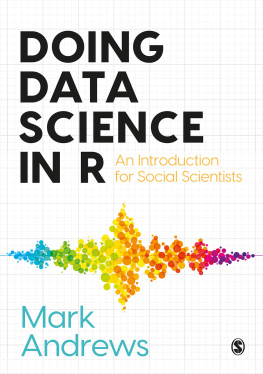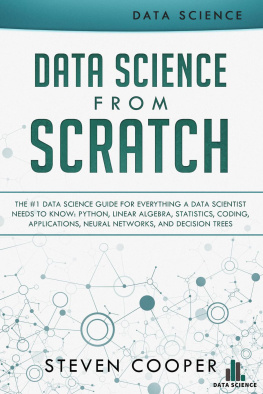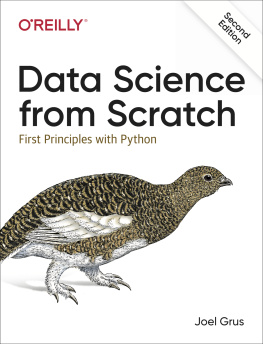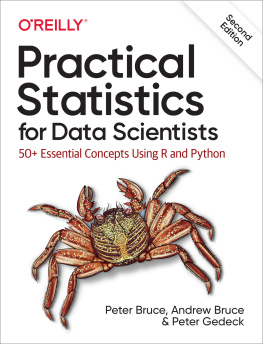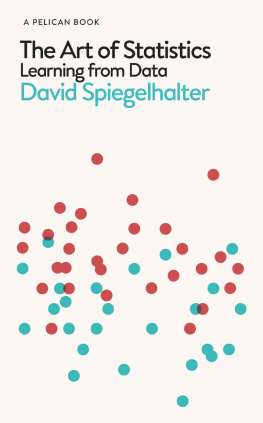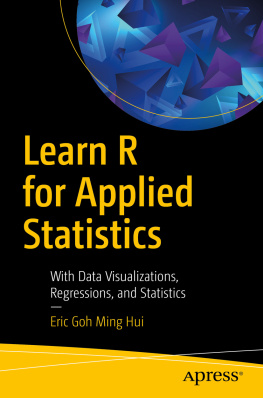THE
DATA
GAME
Controversies in Social Science Statistics
Mark H. Maier
with Todd Easton
THIRD EDITION
First published 1999 by M.E. Sharpe
Published 2016 by Routledge
2 Park Square, Milton Park, Abingdon, Oxon OX14 4RN
711 Third Avenue, New York, NY 10017, USA
Routledge is an imprint of the Taylor & Francis Group, an informa business
Copyright 1999 by Taylor & Francis
No part of this book may be reprinted or reproduced or utilised in any form or by any electronic, mechanical, or other means, now known or hereafter invented, including photocopying and recording, or in any information storage or retrieval system, without permission in writing from the publishers.
Notices
No responsibility is assumed by the publisher for any injury and/or damage to persons or property as a matter of products liability, negligence or otherwise, or from any use of operation of any methods, products, instructions or ideas contained in the material herein.
Practitioners and researchers must always rely on their own experience and knowledge in evaluating and using any information, methods, compounds, or experiments described herein. In using such information or methods they should be mindful of their own safety and the safety of others, including parties for whom they have a professional responsibility.
Product or corporate names may be trademarks or registered trademarks, and are used only for identification and explanation without intent to infringe.
Library of Congress Cataloging-in-Publication Data
Maier, Mark, 1950.
The data game : controversies in social science statistics / Mark H. Maier.3rd ed.
p. cm.
Includes bibliographical references and index.
ISBN 0-7656-0375-6 (cloth : alk. paper). ISBN 0-7656-0376-4 (pbk.: alk. paper)
1. Social sciencesStatistical methods. 2. Social problemsStatistics. I. Title.
HA29.M236 1999
300. 1 5195dc21 98-55371
CIP
ISBN 13: 978-0-7656-0376-0 (pbk)
ISBN 13: 978-0-7656-0375-3 (hbk)
Contents
This book fills the need for a companion text to introductory statistics courses on the collection and use of social science data. It is suitable for undergraduate courses in statistics and research methods, as well as for first courses in statistics offered in many social science graduate programs.
An analysis of statistical source material is readily justified and often called for by social science practitioners. As illustrated throughout this book, many public policy debates arise because of different interpretations of the underlying data. For topics as diverse as the size of the middle class and the crime rate, ambiguities in the data produce statistics that appear to support opposite positions. Cases such as those included here bring statistics to the real world, demonstrating to students the critical role that data play in a wide variety of social issues.
The subject areas in this book include demography, housing, health, education, crime, the national economy, wealth and poverty, labor, business, government, and public opinion polling. For the third edition, all the data sources and controversy sections have been revised and updated where necessary, and new figures have been added. Also new to the third edition are guides to electronic data sources available over the worldwide web.
Students in all disciplines will benefit from this interdisciplinary coverage because much research involves social statistics that transcend narrow subject areas, and because almost every example teaches a lesson that has relevance for all the social sciences. Several common questions recur across the disciplinary spectrum represented in this book. How do the popular media misinterpret social statistics? Why are some social statistics continually cited, even though they are widely known to be misleading? Why are some data collected in abundance, while many critically needed data are missing? Why are the categories into which data are organized so critical for statistical analysis? In addition, fundamental statistical techniques are reviewed, including the difference between surveys and complete counts, index numbers, the use of means and medians, and the use of absolute and relative measures. These issues are probed further in case study questions at the end of each chapter, and they are summarized in the final chapter.
In brief, this book is an invitation to social science research for students, whether as future practitioners in social science or as enlightened citizens. The Data Game demonstrates the excitement, the frustrations, and always the importance of social statistics as an instrument for understanding and changing the world in which we live.
I owe profound thanks to the many specialists who offered guidance in their respective fields of expertise. These generous individuals include Randy Albelda, James Campen, Robert Carson, Todd Easton, Matthew Edel, Mona Field, Theodore Joyce, Peter L. Maier, Scott R. Maier, Richard McGahey, William D. Mosher, Michelle Naples, Robert Pollin, John Queen, Michael Schiller, David Stern, Michael Swerdlow, Robert Untermann, and Thomas E. Weisskopf. I owe special thanks to the late David M. Gordon for his professional advice and encouragement. The early stages of the project benefited from Lou Ferlegers good sense of pedagogy. Steven White, my colleague at Glendale College, has been a savvy political sounding board for my ideas as well as a generous computer consultant. I thank Evan White for drawing the graphs. He did so with his usual speed, talent, and modesty. The third editions guides to electronic data sources are entirely the creative and careful work of Todd Easton, Associate Professor in the School of Business at the University of Portland. In addition, Todds thoughtful feedback on the remainder of the text improved its flow and provided many additional references and expanded commentary. For library assistance, gratitude is due in particular to Brenda Jones, Janet Naumer, and Linda Winters. At M.E. Sharpe, I thank Barbara Leffel, Michael Weber, Patricia Kolb, and Elizabeth Granda. The Glendale College Faculty Development Fund provided much-appreciated release time. Greetings to Sam and Julia, with whom I now can share writing and reading. And, thank you to Anne, my life partner, for support, wisdom, and just being there.
THE
DATA
GAME
Social statistics can be frustrating. It seems as if there are numbers to prove anythingeven entirely opposite points of view. For example, there are statistics to prove that the average U.S. family is becoming richer and that it is becoming poorer; that the crime rate is up and the crime rate is down; that illegal immigration is increasing and that it is decreasing; and that the traditional family is both disappearing and returning.
A quite natural inclination is to reject all statistical results. After all, why trust any number if equally convincing numbers prove precisely the opposite conclusion? This cynical view was summed up by Benjamin Disraeli, who according to Mark Twain listed, in descending order of credibility, lies, damn lies, and statistics. Indeed, examples abound in which politicians, journalists, and policy makers fit statistics to their preconceived ideas. This book provides hints to alert readers to ways in which statistics can be misused.


